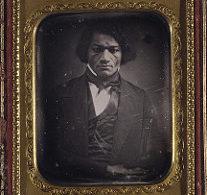I know everyone is familiar with the life and times of Frederick Douglass, the great orator, author and activist. But many people don’t know that Frederick Douglass was also a great journalist. As the original Word Warrior, Frederick Douglass quickly learned to use the press as a weapon in the fight against slavery. Let’s talk about Frederick Douglass the journalist.
Speak then Write
Douglass began his abolitionist career as an orator. He showed a natural talent for rallying his audiences, Black and white, and persuading them to join the anti-slavery movement. He was so impressive and well-received on the lecture circuit, that his fellow abolitionists didn’t want Douglass to pursue his growing interest in starting his own newspaper. They thought taking on the responsibility of running a newspaper would take away from his time and energy as the world’s most sought-after speaker.
The thing is, Douglass had started to write for different abolitionist newspapers, as well as some mainstream papers, almost always writing about the oppression of Black people and advocating for the abolition of slavery. He had a regular column in The New York Anti-Slavery Standard and The Ram’s Horn, but he wanted to create his own newspaper with funds he’d been given by a group of British supporters who also wanted to see Douglass strike out on his own. Witnessing the influence and impact other newspapers were having on public opinion at the time (note this is the era when the penny press begins to flourish), Douglass craved the power that having his own publication could bring.
Frederick Douglass Race Man and Journalist!
Frederick Douglass, like the founders of Freedom’s Journal, believed that having his own newspaper would give him the opportunity to change the narrative of the Black experience in the United States. So exhausted was he by the negative portrayals of Black people in the mainstream press, he believed the only way to truly fight back was to launch his own publication written and edited by Black people. He also wanted his own uncensored vehicle to continue his public and unflinching campaign against slavery.
Douglass wrote the following to describe what his North Star Newspaper would be about.
“The object of The North Star will be to attack slavery in all its forms and aspects; Advocate Universal Emancipation; Exalt the standard of public morality; Promote the Moral and Intellectual improvement of the Colored People; and hasted the day of Freedom to the Three Millions of our Enslaved Fellow Countrymen…”
Behold the North Star
Douglass published the first issue of The North Star on December 3, 1847 in Rochester, New York. The paper’s tagline was, “Right is of no Sex – Truth is of No Color-God is the Father of us all, and we are all brethren.” In addition to advocating for the abolition of slavery, The North Star also supported women’s rights and the freedom of all oppressed groups. The paper grew to enjoy a circulation of more than 4,000 and was read by people in Europe and the Caribbean, in addition to its North American readers. While in print, The North Star was considered to be the most influential abolitionist newspaper in the United States thanks to the editorial leadership of Frederick Douglass.
Gone but not Forgotten
The North Star ceased publication before the Civil War erupted, but that didn’t signify the end of Frederick Douglass’s journalism career. In 1851 The North Star merged with another paper and the new resulting publication was called Frederick Douglass’ Paper. From there, Douglass published a monthly abolitionist magazine, and after the Civil War, he edited a new monthly magazine based in Washington, DC that was created for the newly emancipated Black citizens. It was called, The New National Era. Douglass worked on that magazine for four years until it ceased publication in 1874. Suffice it to say, Frederick Douglass was a prolific journalist who believed in the power of the press.
The Later Years
Douglass continued to write – speeches, books, and the occasional editorial – after The National Era folded, but his professional attention shifted away from journalism to politics and the business of rebuilding the United States where Black people, women and other oppressed people would be treated as true citizens.
Douglass died on February 20, 1895 at the age of 77.


Comments
2 responses to “Frederick Douglass the Journalist”
Thank you, Jane! I so appreciate your comments and encouragement!
Thank you for this information. I did not know Frederick Douglass was a journalist also. Keep on with the needed and interesting knowledge to your followers.